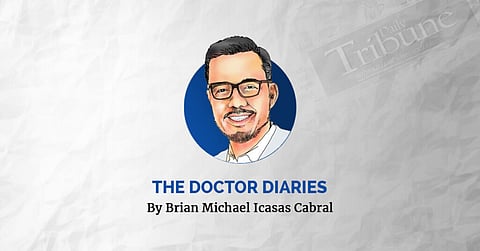
- NEWS
- the EDIT
- COMMENTARY
- BUSINESS
- LIFE
- SHOW
- ACTION
- GLOBAL GOALS
- SNAPS
- DYARYO TIRADA
- MORE

When I returned to Manila in 2009 after intensive medical training abroad, I was filled with optimism and ambition. I eagerly reached out to several prominent hospitals, each welcoming me warmly. One newly-opened hospital offered a unique opportunity: the chance to build an entire department from scratch. With senior colleagues tied to established practices, I poured my energy into that institution, expanding nephrology services and helping shape a culture I believed in deeply.
My efforts led to rapid advancement. At 42, I was appointed Medical Director — a role I had been carefully prepared for, even being sponsored to complete a master’s degree at a renowned US university known for training future leaders. The path was mapped out: my mentor would temporarily serve as CEO until I was ready to take over. I once took him to see Hamilton on Broadway — a moment I thought marked mutual respect and shared purpose. In hindsight, it feels strangely symbolic: a story of youthful ambition, trust, and painful betrayals that soon mirrored my own experiences.
Unfortunately, internal politics soon overshadowed our initial plans. My mentor, enjoying his interim CEO position, chose to remain permanently. My co-medical director, a senior colleague whom I deeply trusted and considered a brother, became instrumental in my removal, delivering a painful message that I was no longer wanted. Another nephrology colleague, whom I had generously supported by stepping aside from my role as head of nephrology to boost his struggling practice, chose allegiance to power over loyalty to friendship. Even a fourth colleague, whose family ties extended to my personal life, aligned himself differently when circumstances changed. Most dishearteningly, fraternity brothers I had long trusted stood silently by, choosing not to intervene as events unfolded.
The method used to justify my departure was a hospital-wide consolidation program, which aimed to streamline leadership roles. Despite clear Department of Health regulations requiring each hospital to maintain a distinct, full-time Medical Director, my role was declared redundant. Deeply shocked by the decision, and driven by a sense of professional and moral obligation, I pursued legal recourse, from the National Labor Relations Commission all the way to the Supreme Court. Although the final verdict did not favor me, I never regretted standing up for what I believed was right, even knowing the odds were stacked against me.
Throughout this challenging period, I maintained an active clinical practice, especially during the pandemic, reaffirming my core commitment as a healer. Amid this difficult chapter, a new leadership opportunity arose — pointed my way by former colleagues who had similarly faced challenges at the institution I left behind. After careful reflection, informed by past experiences, I accepted this new role, determined to lead differently, balancing professional dedication with personal boundaries and well-being.
Today, I approach leadership with renewed humility, resilience, and clarity. The experience taught me crucial lessons about navigating human complexities, recognizing that loyalty, while precious, should never be taken for granted. To younger physicians embarking on their careers, I offer these insights: balance passion with wisdom, trust openly but remain vigilant, and prioritize resilience over mere ambition.
I share my story not for sympathy, but as guidance. Setbacks and betrayals can occur even in noble professions like medicine. Yet resilience — the courage to rise, adapt, and refocus — is always within our grasp. Ultimately, medicine and leadership are fundamentally about dedicated service. Wear your white coat with pride — pride in your profession and the trust it carries — but temper it with humility, always mindful of the responsibility and privilege it entails.
Above all, let wisdom guide your actions, knowing that even in difficult moments, silver linings await, guiding us toward renewal, growth, and deeper understanding. As I continue this journey, I remain reminded of the profound privilege and responsibility we carry as healers — not only to care for patients, but also to stand courageously for the principles that sustain trust in our profession.
